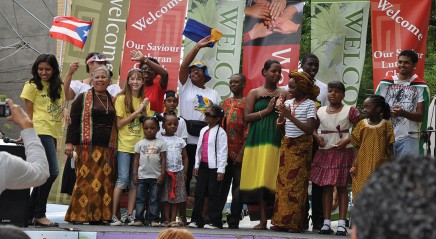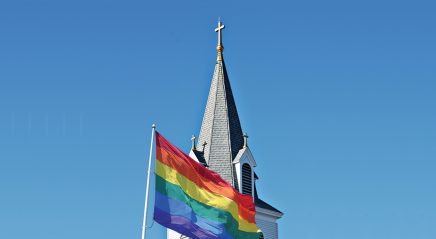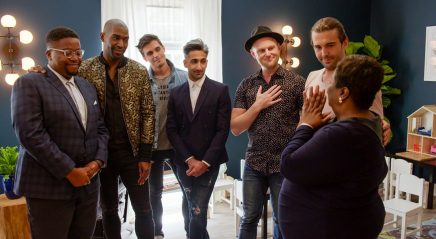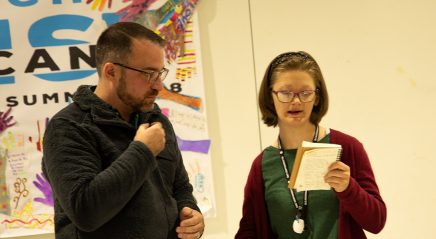Editor’s note: This year the ELCA celebrates 50 years of Lutheran women’s ordination in the United States, 40 years of the ordination of Lutheran women of color and 10 years of Lutheran LGBTQIA+ individuals’ freedom to serve (elca.org/50yearsofordainedwomen). In this eight-part series, these leaders share their joys, struggles and gospel hope.
“So,” says my new dental hygienist as she slips the dental bib around my collar, “I guess I have a question. Doctor M told me a lot about you.”
Doctor M has been my dentist since before I had teeth. He and his wife were longtime church friends with my parents; his daughter and I went trick-or-treating together. He is proud of me. Everyone in his office knows when the woman pastor is coming in.
I don’t respond because the hygienist’s pick is already scraping at six months’ worth of church drip coffee.
“How did you … get into your line of work, you know, being who you are?”
I think: Some days I do not know the answer to that question.
I think: Does she mean because I’m young, or because I’m female, or because I’m queer?
I shrug, and she pauses, glancing at me over her magnifying glasses.
“How did you get into your line of work, being who you are?” Does she mean because I’m young, or because I’m female, or because I’m queer?
Four years in ordained ministry. Fourteen years pursuing the call. Fifteen years explaining why I believe I belong. The Midwest is a tricky place; we’re terrible at saying what we mean in case it might sound impolite. But in 34 years, I’ve gotten pretty good at guessing.
“You mean, because I’m married to a woman?”
She hmms, which is Midwestern for “yes,” and adds, “Were your classes hard at the seminary?”
I consider my possible answers as she pokes at my gums.
I think about the college professors and pastors who cheered me on, and the peers who elected me student congregation president and choir chaplain.
I think of my senior religion course on human sexuality. We spent a semester reading through Western history and contemporary apologetics, discussing each day whether people like me could belong to the body of Christ. Near the course’s end, a fellow student exclaimed, “But it just says it, right there, in Scripture. You can’t be gay. I don’t know why anyone would question this.”
The hygienist goes on, “I know the church can be really hard on … people.” She glances away, seemingly unsure what words she can and can’t use. Even though my mouth is dry, I swallow.
I think of the monthly community dinners my congregation hosts, where strangers assume that my collar means they can say terrible, homophobic things because surely I couldn’t be “one of them.”
“It just says it, right there, in Scripture. You can’t be gay.”
I think about the last time I wrote for a national Christian publication. A gentleman found my church email address and sent me a long diatribe about my sinfulness. He then began calling the church, reading 1 Corinthians 6:9-10 into my voicemail, as if I hadn’t known those verses would be used to condemn me since I was old enough to read my third-grade Good News Bible.
I think about the depressive episodes. Some months, every meeting feels like a mountain and every sermon feels like a siphon sucking up the last drops of my life force. I am not alone in this: depression and anxiety, chemical dependency, self-harm and suicidal ideation run higher among LGBTQIA+ people. We dwell in a world that—from the moment of “It’s a boy!” or “It’s a girl!”—binds us up in boxes that shut out some of the best among us.
I think about the members my church lost after the congregation voted to call me.
I think about the members who joined: the newly out parents patching together a plan with exes and stepparents; the women who got engaged near our rain garden; the couple who sent me photos from vacation with the message, “We miss our pastor!”
I think of the exiles from megachurches and family churches who wander through our church doors on Sunday with wary eyes and coffee. I watch how they watch us. I hope for a moment when I see them relax, just slightly, settling into our padded chairs, maybe with a nod to their friend or partner that suggests, “We might be OK here.” In the line after worship, they shake my hand and make eye contact and say, “We’ll be back next week, Pastor.”
I think of the unanswered emails in my inbox, of people tentatively reaching out after years away from the church and faith, wondering if the whispers could be true—if there’s a place for them again.
I think about the 2-year-old with a stubborn hand held out for bread, our church baby, whom I baptized, whose first memories of church will be with a woman pastor.
I think of the sermons the Spirit wrenches out of me, my hands knuckle-deep in the mud of Scripture, clinging to the promise that there is good news here, somewhere. I think of the matriarch who hugs me close after worship and says, “That was one of your best sermons, Pastor.”
The dental hygienist pulls the mouth mirror back and looks down at me one more time. I nod, releasing a held breath.
“It is hard,” I say, retightening my collar in the reflection of the mirror. “But I don’t think I could do anything else.”







